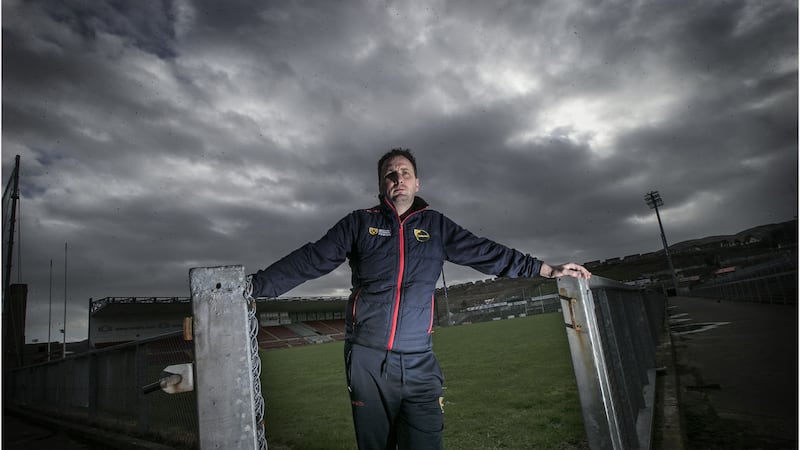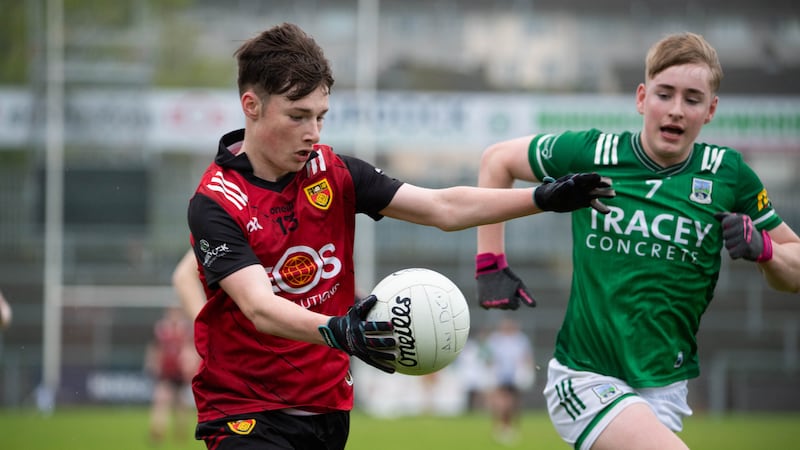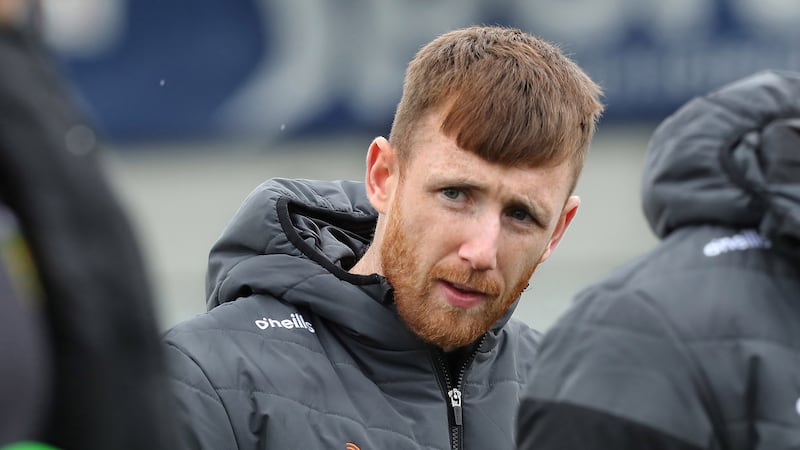MARCH 7, 2007. Up in the back of the Gerry Arthurs Stand is a small pocket of green, swallowed up in the maroon sea of St Paul’s Bessbrook.
“There were about 3,500 people in Clones that day, about 3,300 of them from Bessbrook. We’d this little pocket of supporters all hemmed off, it was like a scene from Galatasary.”
It’s 12 years and a day later as Steven Poacher sits in Finegan’s in the heart of Newry with Friday morning turning to afternoon.
In the footballing sense, this was everything. Little St Columban’s, Kilkeel. The year before it closed, there were 148 pupils in it. Bessbrook’s enrolment is almost ten times that.
He met Cathal Doyle in town last year. All his former pupil wanted to talk about was the goal that day. Doyle had drifted to full-forward on a set-play routine, taken the ball and popped in Diarmuid Flanagan for the only goal in a one-point win.
They’d run it on the training ground time and again. Same way Carlow have run the kickout routine off which they cut Louth open two weeks ago, for the only goal in a one-point win.
But 2007 was about more than football.
A fortnight earlier, he was at home in Castlewellan when his phone rang. The news was of Conor Walsh, a former pupil at the school and a talented young player with An Riocht, who had taken his own life.
Diarmuid Flanagan, who scored the goal in Clones, was a first cousin. He played the game with ‘Walshie’ written on his forearm.
“In that space of 10 months, Mourne had about 13 suicides. Nearly every one of those was related to our school in some way, mostly past pupils.
“They had a major impact on me. It showed me the vulnerability of a young person’s life, how it can be taken away forever like that.”
St Columban’s went on to win the All-Ireland Vocational Schools three weeks later, the smallest school ever to do so.
“That victory changed a community. It lifted a dark cloud and brought excitement and joy.
“The emotion in Mullingar that day, I don’t think there was a person left in Mourne.
“It’s just a million miles away from the wakes you were attending and the phone calls you were getting a few months before that.
“Football is so powerful. We forget the difference it can make in young peoples’ lives.”
In 2006, he’d married Marie, whom he’d met in Manchester where they both studied. Married life was, and is, happy but they were living in Castlewellan and wanted to be back in Newry, only they couldn’t afford it.
Steven had transferred clubs but missed his native Mitchel’s, and everything else about the city. The social scene.
On top of it, his father, Anthony, had gone in for a prostate exam when doctors found a heart arrhythmia.
“He went through a tough couple of years, had to get three or four different procedures done, and he’s on tablets for the rest of his life.
“He’s lucky he’s still here. But he’s 74 now, he keeps himself in great health.”
It’s always been the simple things. It was from him that the love of both football and coaching was derived. From setting up his own soccer team that had the likes of Ronan Sexton, Benny Coulter, Mickey Walsh and Danny Hughes on it, to the hours on end spent knocking the paint off the gable wall by kicking the ball back to himself, sport was their staple diet.
It wasn’t always plain sailing. A couple of suspensions from the Abbey – “for silly things, fireworks and stuff. He was never out of Dermot McGovern’s office” – threatened to derail him in his teenage years.
But then there was the other side of Steven, the one that that never touched a drink until he was 20 and was, for a long time, devoutly religious.
“If I missed mass on a Sunday, I’d make sure and go on a Tuesday or Thursday in the old chapel.”
He found himself arguing vehemently with the local clergy over the closure of St Columban’s, where he worked for 18 years, feeling the local children had been “hung out to dry”.
Steven and Marie pulled their oldest girl Caitlin-Rose out of doing the transfer test this year.
“I’ve been preaching for years that a test at 10 years of age is absolutely disgusting,” says the PE teacher, who is now charged with developing Gaelic Games at Lismore Comprehensive.
“To judge a young person’s future academic potential at 10 is an absolute disgrace, a sin and morally wrong.
“For me, it’s like football. If you lined up all the footballers at 10 years of age and said ‘you’re going to make it, you’re not, you’ll make it, you’ll not’, it’s not allowing for future development, athletically, technically, mentally.”
Anthony and Steven’s mother Rosena will get two buses to Carlow this morning. His father jokes they won’t go on the Down supporters’ bus because he’s ‘afraid you’ll do something mad’.
He hopes now that when Eibhlinn and Caitlin-Rose are older, they’ll remember the trips to Carlow and the walks through the Mournes the way their father remembers going to Omeath every Saturday to do the lotto, or getting changed in the Bridge Bar to go and play for his Dad in the Carnbane League.
The time in Carlow eats into his time at home. That won’t last forever, but the memories will.
******
HIS heart is in the city but he has the soul of a country boy. He spent his teens out building tree-houses, getting chases off the farmers, burning ditches at Halloween.
“We weren’t 10-year-olds, we’re 14 or 15. We were innocent. Kids don’t do that anymore.”
Since moving to Lismore Comprehensive, he misses the drive through the Mournes back from the old job in Kilkeel.
Along with John Clarke, he’d religiously have stopped twice a week and run up Kilbroney Mountain. For 18 years, that’s how he cleared his head.
People have their own preconceived ideas of who and what he is. He can live with that.
But there’s a lot to know. Take his fear of flying, which developed when a flight he was on in 1999 had to circle for hours between Bolton and Manchester for hours, dumping fuel in preparation for an emergency landing.
“I saw the Reebok Stadium about 15 times and was thinking ‘this doesn’t look right’.”
He got on a plane again soon after but took an anxiety attack and had to plead with the pilot to let him off before it left base. Didn’t fly again for 10 years before Marie sent him on a fear of flying course in Dublin, since when he’s dipped his toe back in the water, as they will next month when they fly to New York.
They’ll be guests of New York GAA, with Poacher due to take a coaching workshop with their U16 development squad.
It was with Down’s development squads that he enhanced his reputation, yet his thinking on them is that they’ve “become too much about winning and lost the most important aspect, which is the development of the young player and the young person.”
“I remember Barney McAleenan telling me when he was over Jordanstown, some of the best footballers around can’t f***ing kick pass the ball at 21 years of age, but put them in a tight t-shirt and they’ll look gorgeous, muscles bouncing off them and they’ve got the wee vein [pointing to his bicep].
“The gym culture’s still there but we went through a phase where it was nearly more important to have a strength and conditioning coach than a football coach.”
His playing days were, by his own admission, modest. He’d been more into soccer until he was 16, at which point he was doing nets for the Mitchel’s before moving outfield. Nobody beyond Down would’ve known him as a player.
But as a coach, he’s become a familiar face.
What that face represents depends wholly on the beholder’s personal preference.
In person, he’s nothing less than engaging (more so than usual, he admits, as he trials a digital detox by leaving his phone at home).
His mind zips around at 100mph while his throat does its best to keep the stream of words from clogging up.
Whatever people think he is, he makes no apologies for.
“A genius!” he chuckles when asked when he thinks public perception of him is.
He tries to bat the criticism away, says he takes it “as a compliment”, but it touches a nerve.
Colm Parkinson annoys him. Joe Brolly annoys him. Having his father ring him late on Father’s Day, wondering down the phone why he’s the topic of discussion on The Sunday Game again tonight.
Carlow’s televised games have been all against bigger fish. Dublin, Monaghan, Tyrone. And, to a much smaller extent, Laois.
They’ve played those games accordingly, but it’s on those that his reputation has been moulded in the public psyche. Nothing else really registers.
There’s no denying the way they played those days. They packed 15 men back in their own 45’, waited for the fly to step into the ointment and went from there. And there’s the argument that what they did from there was the weakness.
“90 per cent of our training is based around scoring…”
90 per cent, really?
“90 per cent. That’s no bullshit. 90 per cent of our training is based around offensive games.
“I’d like people to make judgements about me when they come to a workshop, when they see what I tell coaches. I preach football first all the time, especially underage football.
“People are just listening to mass hysteria and ‘Poacher’s a defensive coach’. I’m not a defensive coach. I’m a coach.”
And then he delves into his past by way of defence, and how Mayobridge were the top scorers in Division One the one year he had them, how An Riocht played with six forwards.
Ballyholland weren’t blessed with the same attacking resources, so he went the defensive way with them. The fact that it was the job that overlapped with his work in Carlow has seen what is clearly an unwanted tag become set in stone.
“You give me a forward line like Corofin’s, I’ll play a different way.”
But would he pay his last £20 to go and watch Carlow?
“Well if you’re from Carlow you definitely would. If you’re not from Carlow and you don’t like me you’d probably go hoping they’re beat,” he laughs.
******
THE luck of the draw has allowed him to attend Down’s home Saturday night ties against Laois and Westmeath this year. He attends Páirc Esler not as Carlow’s coach, but as a Down fan, even someone who’s played a hand in developing so many of the players at Paddy Tally’s disposal.
“I’m there as a supporter, I’m a Down man. A few Westmeath people up behind me couldn’t understand why I was cheering Down’s winner at the end.
“That’s your county, that’s your team.”
This afternoon, he’ll stand in Carlow dugout alongside Turlough O’Brien.
Poacher will invest every ounce in trying to derail his native county’s promotion hopes in a bid to spark those of his adopted land. To create another memorable day for the emboldened Carlow supporters who have been given a reason to love their team, even if others don’t.
His name was mentioned in dispatches when Eamonn Burns stepped down, but after some consideration Poacher withdrew from the race and threw his weight behind Tally’s bid.
“I think the time is right for an outside man. I mean that, hand on heart. Internally, we still have a group of people in administration that an outside person just might it easier to move on with,” he said at the time.
His fractured relationship with certain men behind the scenes in Down is no secret. Much of it stems from a team of Francie Poland, Benny Coulter, John Clarke and Poacher not getting the U21 job when they applied in 2016.
The two-hour conversation begins and ends on the topic of fallouts. There have been plenty. Most of them were short. Some have lasted, and some of those longer than he’d have liked himself.
Cathal Murray comes to mind, the pair having once been tight. It’s a regret for Poacher that they haven’t spoken civil words in a couple of years.
He still harbours the dream that one day, he’ll come home, even if it’s in a different capacity.
”Things happen in life. You talk about fallouts, things happen, words are exchanged, people fall out. I’ve mellowed the last couple of years.
“Not getting the U21s in October 2016 was the best thing ever happened my coaching career. I reflect a lot, I can be very sentimental and I’m a softie at heart really.
“Going to Leinster for three years is the best coaching experience I could ever have. The journey hardened me. A lot of time spent on your own in the car, a lot of thinking time. That builds a resilience.
“For me, it’s pedantic stuff. They say time’s a great healer and for me, life’s too short.
“I’ve seen the impact that it’s had on young people in Mourne all those years ago, and the fragility of life as well.
“Two people this week, a cousin of mine lost his wife at 40 years of age to cancer, another young girl that used to work with my sister passed away last week at 40 years of age from cancer.
“You think to yourself, what’s it all about?
“It’s football, it’s not life or death.”
Carlow is football, it’s a labour of love, it’s an experience he’ll cherish.
Down will always be home.








